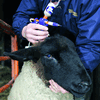DEFRA given chance to order more bluetongue vaccine

Vaccine manufacturer Fort Dodge has offered DEFRA the opportunity to order doses of its bluetongue vaccines to top up those already being supplied by Intervet, in the belief that current supplies will be insufficient.
DEFRA has already ordered 22.5m doses off vaccine from Intervet, but Fort Dodge’s UK managing director John Hanley said he was convinced England will need more than that, particularly as limited quantities were likely to be available early in summer.
Speaking at a press briefing in London earlier today (10 March), Mr Hanley said there was a real possibility of a ‘vaccine gap’ early in the year unless more supplies were ordered.
Central tenders or free market?
“The 2m doses industry has been told will be available in May are likely to prove insufficient to meet demand at that time, particularly as midge activity is likely to start again soon.” he claimed.
The company has approached DEFRA and asked whether it intended to issue further central tenders this year or whether it would be seeking to develop a free-market for the vaccine.
“As yet they haven’t given us a firm answer, but we believe it is interested in seeking further supplies.
“However, with supply limited this year it is essential DEFRA makes up its mind shortly to benefit UK farming. We are on track to produce 5m doses for May and another 5m or so every month after that, but without a firm order from DEFRA it is likely other countries which place orders with Fort Dodge will be served first. Leaving future supplies at the mercy of the free market could see the UK go short this summer.”
Vaccine details
Fort Dodge’s vaccine will be species specific and will be a two dose product for both cattle and sheep, with dose size likely to be 2ml, explained the company’s vet David Bartram.
“But our vaccine should be able to block viraemia in sheep, a critical factor in arresting virus transmission.”
Additionally, Fort Dodge hopes to able to offer multi-valant vaccines in future, possibly as soon as 2009, to tackle the threat posed by other bluetongue strains currently circulating in other areas of Europe, including BTV-1 and BTV-4, he added.
